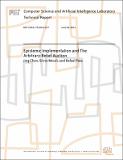Epistemic Implementation and The Arbitrary-Belief Auction
Author(s)
Chen, Jing; Micali, Silvio; Pass, Rafael
DownloadMIT-CSAIL-TR-2012-017.pdf (379.0Kb)
Other Contributors
Theory of Computation
Advisor
Silvio Micali
Metadata
Show full item recordAbstract
In settings of incomplete information we put forward an epistemic framework for designing mechanisms that successfully leverage the players' arbitrary higher-order beliefs, even when such beliefs are totally wrong, and even when the players are rational in a very weak sense. Following Aumann (1995), we consider a player i rational if he uses a pure strategy s_i such that no alternative pure strategy s_i' performs better than s_i in every world i considers possible, and consider him order-k rational if he is rational and believes that all other players are order-(k-1) rational. We then introduce an iterative deletion procedure of dominated strategies and use it to precisely characterize the strategies consistent with the players being order-k rational. We exemplify the power of our framework in single-good auctions by introducing and achieving a new class of revenue benchmarks, defined over the players' arbitrary beliefs, that can be much higher than classical ones, and are unattainable by traditional mechanisms. Namely, we exhibit a mechanism that, for every k greater than or equal to 0 and epsilon>0 and whenever the players are order-(k+1) rational, guarantees revenue greater than or equal to G^k-epsilon, where G^k is the second highest belief about belief about ... (k times) about the highest valuation of some player, even when such a player's identity is not precisely known. Importantly, our mechanism is possibilistic interim individually rational. Essentially this means that, based on his beliefs, a player's utility is non-negative not in expectation, but in each world he believes possible. We finally show that our benchmark G^k is so demanding that it separates the revenue achievable with order-k rational players from that achievable with order-(k+1) rational ones. That is, no possibilistic interim individually rational mechanism can guarantee revenue greater than or equal to G^k-c, for any constant c>0, when the players are only order-k rational.
Date issued
2012-06-22Series/Report no.
MIT-CSAIL-TR-2012-017
Keywords
higher-order beliefs, higher-order rationality, revenue